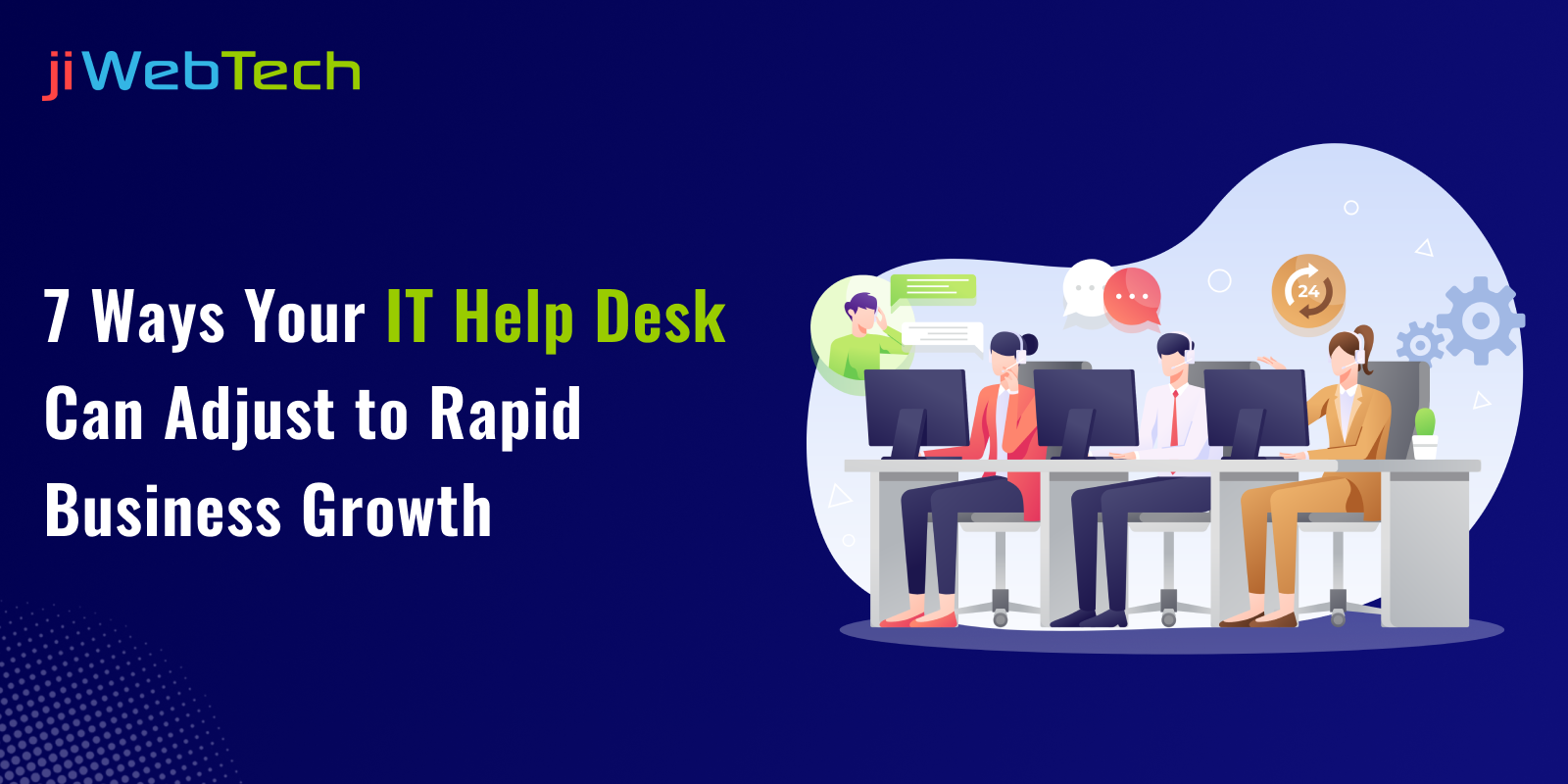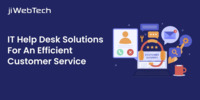- Apr 15, 2024
- IT Help Desk
- 2776
Share this post on:

In the dynamic landscape of modern business, growth is often the ultimate goal. However, with growth comes a host of challenges, especially for your IT help desk. As your business expands, the demands on your IT support team increase exponentially. From managing more users and devices to handling a wider array of technical issues, the pressure on your help desk can quickly become overwhelming.
As companies expand, their IT infrastructure and support systems must also scale to meet the increasing demands. The IT help desk plays a crucial role in ensuring that technology issues are addressed promptly and efficiently to support business operations.
7 ways your IT help desk can adjust to rapid business growth
Here are seven ways your IT help desk software can adjust to rapid business growth:

1. Invest in Scalable IT Help Desk Software
Implementing scalable IT help desk software is essential for managing a growing number of support requests effectively. Look for service desk software that can accommodate increased ticket volumes, automate repetitive tasks, and provide analytics to identify trends and areas for improvement.
2. Streamline Processes with Service Desk Software
Service desk software can streamline IT support processes by centralizing ticket management, automating workflows, and enabling self-service options for users. By standardizing procedures and workflows, your IT help desk can handle a higher volume of requests without compromising quality.
3. Enhance Communication Channels
As your business grows, communication becomes even more critical. Ensure that your IT help desk has multiple channels for users to reach out for support, such as email, phone, chat, or a self-service portal. Clear communication channels will help manage expectations and improve user satisfaction.
4. Provide Continuous Training and Development
Investing in the training and development of your IT help desk staff is crucial for adapting to rapid growth. Ensure that your team is equipped with the necessary skills and knowledge to handle new technologies and evolving business requirements effectively.
5. Implement Knowledge Management Systems
Knowledge management systems can empower your IT help desk agents with access to a centralized repository of solutions and best practices. By capturing and sharing knowledge within the organization, you can resolve issues faster and enhance overall service quality.
6. Monitor Performance Metrics
Tracking key performance metrics such as response times, resolution rates, customer satisfaction scores, and ticket volumes is essential for optimizing IT help desk operations. Use these metrics to identify bottlenecks, measure efficiency, and make data-driven decisions to improve service delivery.
7. Proactively Identify Help Desk Problems and Solutions
Anticipate potential challenges that may arise due to rapid business growth and proactively address them before they impact operations. Regularly review help desk processes, gather feedback from users, and implement continuous improvements to ensure that your IT support remains agile and responsive.
Benefits of an IT Help Desk for Business
An IT help desk serves as the frontline support system for businesses, offering assistance and solutions to users encountering technical issues or needing IT-related guidance. The benefits of having an IT help desk for businesses are numerous and can significantly impact productivity, efficiency, and overall success. Here are some key benefits:
1. 24/7 Support: An IT help desk provides round-the-clock support, ensuring that technical issues can be addressed promptly, regardless of the time of day. This continuous support minimizes downtime and allows employees to remain productive, even outside regular working hours.
2. Improved Productivity: By resolving technical issues quickly and efficiently, an IT help desk helps employees stay focused on their tasks without being hindered by IT-related disruptions. Increased productivity leads to better workflow efficiency and ultimately contributes to business growth.
3. Cost-Effective Solution: Investing in an IT help desk can be more cost-effective than hiring dedicated in-house IT staff, especially for small to medium-sized businesses. Outsourcing help desk services or utilizing remote support can provide access to expert assistance without the expense of maintaining a full IT department.
4. Centralized Knowledge Repository: IT help desks often maintain a centralized knowledge base or FAQ section where users can find answers to common technical questions and troubleshoot issues independently. This repository not only empowers users to resolve minor issues on their own but also reduces the number of support requests, freeing up help desk resources for more complex issues.
5. Enhanced Security: IT help desks play a crucial role in ensuring the security of business data and IT systems. They implement security protocols, monitor for potential threats, and educate users on best practices for data protection and cybersecurity. By proactively addressing security concerns, help desks help mitigate the risk of data breaches and cyberattacks.
6. Customer Satisfaction: For businesses that offer products or services to external customers, an efficient IT help desk can significantly impact customer satisfaction. Resolving customer inquiries and technical issues promptly demonstrates professionalism and dedication to customer service, fostering positive relationships and encouraging repeat business.
7. Scalability: As businesses grow and evolve, their IT needs also change. An IT help desk can scale its services to accommodate increasing demands, whether it's expanding support for additional users, integrating new technologies, or adapting to changing business requirements. This scalability ensures that IT support remains effective and responsive, regardless of the organization's size or complexity.
8. Data Analysis and Insights: IT help desks often collect data on support requests, issue resolutions, and user feedback. Analyzing this data provides valuable insights into IT performance, user satisfaction, and common pain points. Businesses can use these insights to identify areas for improvement, optimize IT processes, and make informed decisions about resource allocation and technology investments.
Conclusion:
Overall, an IT help desk is a vital component of modern businesses. It plays a crucial role in driving efficiency, innovation, and growth of a business. As a business grows rapidly, the IT help desk needs to adjust to meet the increased demand for support
So, if you are looking for an IT Help desk solution that helps you manage your organization effectively, look no further than jiWebTech. Invest in our robust IT Help Desk Software and see by yourself how an IT help desk can improve your business.










